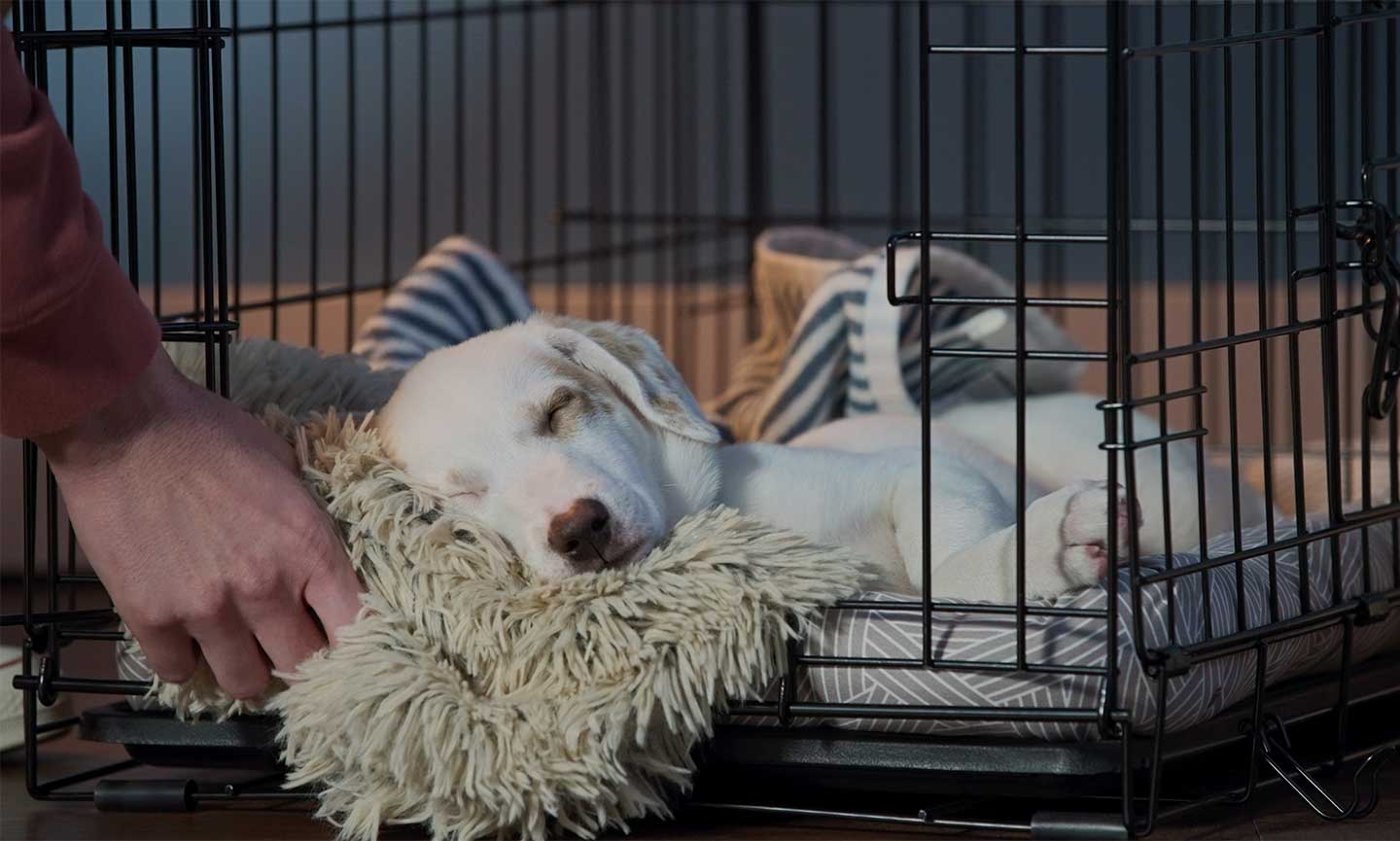To get your dog to sleep through the night, establish a consistent bedtime routine and provide plenty of exercise and mental stimulation throughout the day. Avoid giving food or water right before bedtime, and create a comfortable sleeping space for your dog.
In addition, consider using calming techniques such as soothing music or a cozy blanket to help your dog relax and settle down for the night. By implementing these strategies, you can help promote a more restful and uninterrupted sleep for your furry friend, ensuring a healthier and happier pet overall.

Credit: be.chewy.com
Establishing A Bedtime Routine
Getting your dog to sleep through the night can be a challenging task, especially if they are accustomed to staying up late or waking you up in the middle of the night. One of the key strategies to help your furry friend develop a healthy sleep pattern is by establishing a bedtime routine. Dogs are creatures of habit, so implementing a consistent and reliable routine will not only help them sleep better but also ensure your own peaceful slumber. Let’s explore two important aspects of creating a successful bedtime routine: creating a consistent schedule and providing a comfortable sleeping space.
Create A Consistent Schedule
Setting a consistent schedule is crucial for helping your dog adjust to a regular sleep pattern. Dogs are creatures of habit and thrive on routine, so having a structured bedtime schedule can signal to them that it’s time to wind down and prepare for sleep. Here are a few tips to create a consistent schedule:
- Stick to the same bedtime every night.
- Avoid disruptive activities or high-energy play right before bedtime.
- Establish a pre-sleep routine, such as a short walk and gentle grooming.
- Incorporate relaxation techniques, such as providing a calming massage or playing soft music.
By following a consistent schedule, your dog will start associating these activities with bedtime and become naturally tired at the same time each night.
Provide A Comfortable Sleeping Space
A comfortable sleeping space is essential for your dog to relax and sleep soundly throughout the night. Here are some tips to ensure your dog’s sleeping space is comfortable:
- Choose a designated area for your dog to sleep, such as a cozy dog bed or crate.
- Make sure the sleeping space is quiet and free from distractions.
- Ensure the temperature is optimal for your dog’s comfort – not too hot or too cold.
- Use comfortable bedding that provides support and cushioning for your dog’s body.
Additionally, you can consider adding familiar scents, such as a piece of your clothing, to the sleeping area to provide a sense of security and familiarity.
By establishing a bedtime routine that includes a consistent schedule and a comfortable sleeping space, you can teach your dog to sleep through the night peacefully, benefiting both your canine companion and yourself.

Credit: www.pbspettravel.co.uk
Promoting Relaxation
Creating a serene environment for your dog is essential in helping them sleep through the night. Promoting relaxation can help reduce anxiety and stress, encouraging a peaceful night’s rest. Here are some techniques to help your furry companion unwind and achieve a restful slumber.
Engage In Calming Activities
Engage your dog in calming activities to promote relaxation before bedtime. Gentle exercises such as a leisurely stroll or a soothing play session can help alleviate restlessness. Additionally, incorporate activities that encourage mental stimulation, such as puzzle games or training exercises, to help tire your dog’s mind and body.
Try Aromatherapy For Dogs
Consider introducing aromatherapy to create a tranquil atmosphere for your dog. Certain scents, such as lavender and chamomile, are known for their calming properties. Utilize essential oils in a diffuser or apply them to your dog’s bedding to help induce a state of relaxation. However, it is important to consult with a veterinarian before using any essential oils to ensure they are safe for your pet.
Encouraging Physical Exercise
Encouraging physical exercise is essential in helping your dog sleep through the night. Dogs, like humans, need regular physical activity to stay healthy and burn off excess energy. By incorporating a few simple strategies into your routine, you can help ensure that your furry friend gets the exercise they need.
Increase Daily Activity Levels
Increasing your dog’s daily activity levels can help them sleep better at night. Take longer walks, visit a dog park, or play fetch to provide additional exercise. Engaging in more physical activity during the day can lead to a more restful night for your pet.
Incorporate Interactive Toys
Incorporating interactive toys into your dog’s daily routine can help increase their physical activity. Interactive toys, such as treat-dispensing puzzles or tug-of-war ropes, can provide mental and physical stimulation. These activities will keep your dog active and engaged, ultimately aiding in a better night’s sleep.
Addressing Potential Discomfort
Help your dog sleep soundly at night by addressing potential discomfort. Create a comfortable sleeping environment, provide adequate exercise, and establish a consistent bedtime routine to promote a peaceful night’s sleep.
Rule Out Medical Conditions
Before addressing your dog’s potential discomfort, it’s important to rule out any underlying medical conditions that may be causing sleep disturbances. Consulting with a veterinarian can help determine if there are any health issues affecting your dog’s ability to sleep through the night.
Common medical conditions that can disrupt your dog’s sleep include urinary tract infections, gastrointestinal issues, allergies, arthritis, and dental problems. Identifying and treating these conditions is essential for helping your furry friend achieve a good night’s sleep.
If you notice any changes in your dog’s behavior or suspect a medical issue may be the cause of their restless nights, schedule a visit with your trusted vet. They can conduct the necessary tests and examinations to diagnose and treat any underlying medical conditions.
Ensure Optimal Sleeping Conditions
Creating a comfortable sleeping environment is crucial for your dog’s ability to sleep soundly throughout the night. By addressing potential discomfort and optimizing the conditions, you can help your canine companion drift off into a peaceful slumber.
Bedding and Mattress:
Choose a well-padded and supportive bed that suits your dog’s size and needs. Orthopedic beds can be particularly beneficial for older dogs or those with joint pain. Make sure the bedding is clean, cozy, and free from any allergens that could trigger discomfort or allergies.
Temperature and Ventilation:
Avoid extreme temperatures in the room where your dog sleeps. Ensure there is proper ventilation or use a fan, air conditioner, or heater to regulate the temperature. Dogs are sensitive to heat, so keeping the room cool during hot weather is essential for their comfort.
Noise and Light:
Create a quiet and dark sleeping environment for your dog. Use curtains, blinds, or shades to block out excessive light, especially if your dog is sensitive to brightness. Minimize noise disturbances by placing the dog’s bed away from high-traffic areas or using white noise machines to drown out external sounds.
Remove Potential Distractions:
Eliminate any objects or stimuli that may cause your dog to feel restless. This could include moving their bed away from windows with frequent outdoor activity, removing noisy toys, or keeping other pets or children away from the sleeping area.
Establish a Bedtime Routine:
Introduce a consistent bedtime routine that signals to your dog that it’s time to relax and unwind. This can include calming activities like a short walk, gentle brushing, or a relaxing massage. The routine will help your dog associate these activities with sleep and create a sense of comfort and relaxation.
By addressing potential discomfort and ensuring optimal sleeping conditions, you can help your dog sleep through the night and wake up refreshed and ready for a new day of adventures.
Minimizing Nighttime Disturbances
Help your furry friend get a good night’s sleep by minimizing nighttime disturbances. Follow these expert tips to ensure your dog sleeps soundly throughout the night.
Avoid Feeding Or Offering Water Before Bed
One way to minimize nighttime disturbances and help your dog sleep through the night is by avoiding feeding or offering water right before bed. Just like us humans, dogs need some time to digest their food properly.
Feeding your dog too close to bedtime can cause indigestion and discomfort, which can lead to restless nights and disruptive behavior. By establishing a regular feeding schedule and ensuring that your furry friend eats at least a few hours before bedtime, you can help promote peaceful sleep.
This also applies to water. While it’s important to keep your dog well-hydrated, offering water right before bed can result in late-night bathroom breaks. Limiting your dog’s access to water in the hours leading up to bedtime can help reduce the need for nighttime potty breaks.
Keep The Environment Quiet And Dark
Another way to create a peaceful sleeping environment for your dog is by keeping the area quiet and dark. Just like humans, dogs can be sensitive to noise and light disturbances that can disrupt their sleep.
First, find a calm and quiet area in your home where your dog can sleep undisturbed. This can be a designated dog bed in a secluded corner or even a crate if your dog is crate trained.
To further minimize noise, consider using white noise machines or fans to mask any disruptive sounds in the environment. These devices can help drown out noises that may startle or disturb your dog during the night.
Additionally, make sure the sleeping area is dark. Use blackout curtains or blinds to block out any external lights that may enter the room. Dogs, like humans, have a natural inclination to sleep in darkness, and creating a dark sleeping environment can greatly improve their sleep quality.
By following these tips and creating a calming and disturbance-free environment for your dog, you can help them establish a healthy sleep routine and get those well-deserved restful nights they need.

Credit: www.pinterest.com
Frequently Asked Questions On How To Get My Dog To Sleep Through The Night
How Can I Help My Dog Sleep Peacefully At Night?
Creating a comfortable sleeping environment for your dog is key to ensure uninterrupted sleep. Provide a cozy bed, maintain a consistent bedtime routine, and engage in calming activities before bed. Avoid feeding your dog heavy meals or giving them too much water before bedtime to prevent disturbances during the night.
Why Does My Dog Wake Up During The Night?
There are several reasons why your dog may wake up during the night. Common causes include discomfort, anxiety, inadequate exercise or mental stimulation, needing to go out for a bathroom break, or medical issues. Assessing and addressing these factors can help your dog get better sleep and reduce nighttime awakenings.
How Long Should My Dog Sleep At Night?
Dogs require varying amounts of sleep depending on their age, size, and breed. On average, adult dogs sleep around 12-14 hours a day, with nighttime sleep comprising a significant portion. Puppies and senior dogs may need more sleep. Observe your dog’s behavior during the day to ensure they are getting sufficient rest at night.
Conclusion
To help your furry friend sleep soundly through the night, it’s important to establish a consistent routine, provide a comfortable sleeping environment, and address any underlying health issues. By incorporating these tips and techniques into your dog’s bedtime routine, you can improve their sleep quality and overall well-being.
Remember, patience and persistence are key when it comes to helping your dog develop healthy sleep habits. With a little effort and understanding, you’ll be enjoying peaceful nights together in no time.



